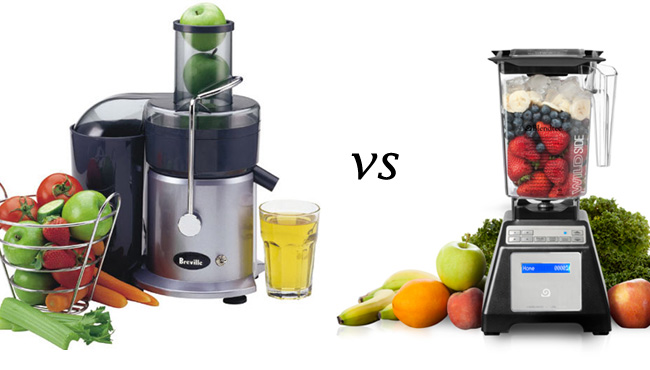Should you get a juicer or a blender? by Caitlin de Kok
Juicing and blending are great ways to supplement a healthy diet and can offer you some delicious beverages in the process, but which is better?
Blenders
Blenders mulch, crush and pulverize the contents placed in them making the smooth pulpy liquid which one can drink. This process keeps all the fibre and pulp of the fruit or vegetable blended. This means that your smoothie will contain the sum total of all the contents placed into the blender (this may sound like oversimplification but has important implications).
Juicers
Most kitchen juicers extract the liquid contents of the fruit or vegetable by grinding your fruits and veggies and then pushing the extracted juice through a strainer by spinning at a very high speed. The pulp is extracted and ejected into a special compartment, usually near the back of the juicer. So the juice consumed is the water and most of the nutrients the produce contains.
But which one should you buy?
This question is wholly dependent on what produce you wish to use. Fruits should not be juiced as they contain very high amounts of fructose and when consumed in juice can actually increase the risk of diabetes. This seems counter intuitive as fruits are full of “good” sugars but here’s why… to make a glass of orange juice you would need to juice two to three oranges.
Normally eating an orange is very good for you because the fibre in the orange offsets the amount of sugar you get from the orange. Juicing the orange now removes all the fibre and leaves you with the vitamins and a large amount of fructose sugar. Multiply this several times and you will see that you are consuming more sugar than fibre which isn’t the healthiest choice.
Vegetables on the other hand suit a juicer very well, they are lower in sugar and a juicer helps you absorb all the nutrients from the vegetables. This is important because most of us have impaired digestion as a result of making less-than-optimal food choices over many years. This limits your body’s ability to absorb all the nutrients from the vegetables. Juicing will help to “pre-digest” them for you, so you will receive most of the nutrition, rather than having it go down the toilet.
Therefore a vegetable juice is a very efficient means to get all the nutritional value from your vegetables in one go.
Juicers are fantastic inventions that can help you get the most out of your produce in a quick and efficient manner, but they are quite costly and will consume a lot of vegetables and fruit for the amount of juice you’ll get out. They can also assist in weight loss by providing you with all the nutrients your diet requires without the empty calories in the starches of your fruits and veggies.
It is important to note that vegetable juice has very little protein and virtually no fat, so by itself, it is not really a complete food. It really should be used in addition to your regular meals not in place of it.
Blenders on the other hand are great at retaining the healthy fibres in your fruit and veggies and can turn a well-balanced smoothie into a meal replacement. Smoothies also tend to be more filling, because of the fibre, and are generally faster to make than juice, so they can be great to drink first thing in the morning as your breakfast, or for snacks throughout the day
So the benefits of blending and juicing are quite evenly matched. The choice is yours, which will you choose?

